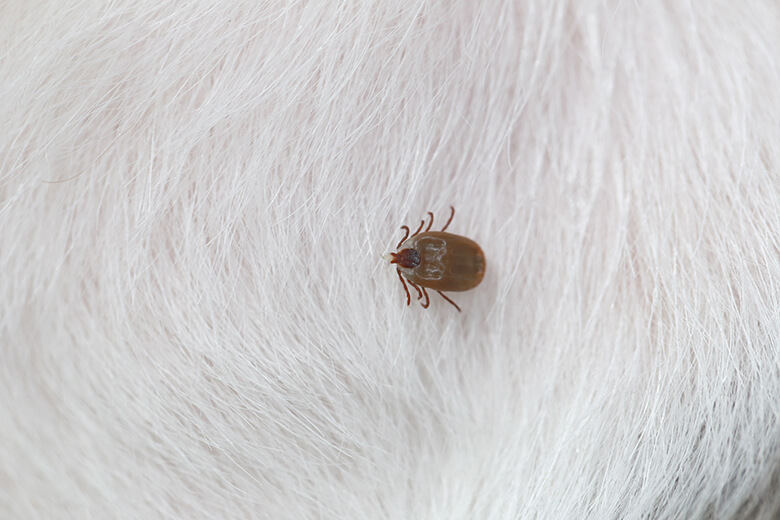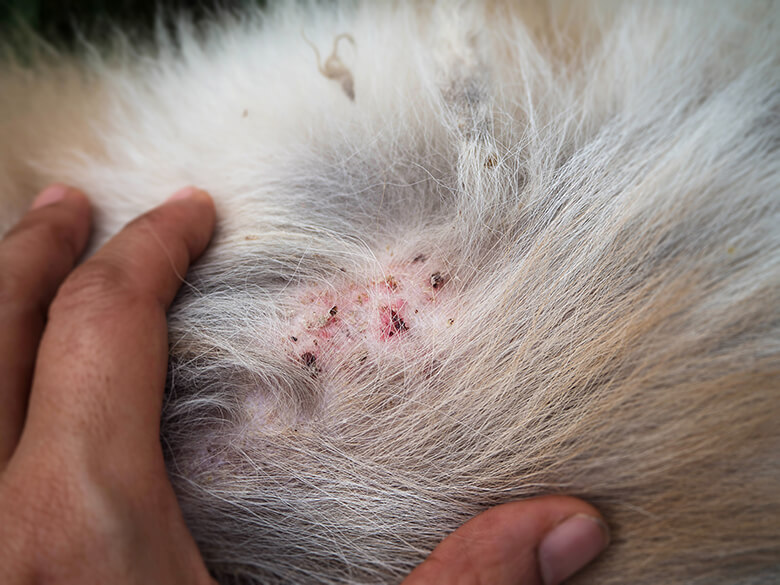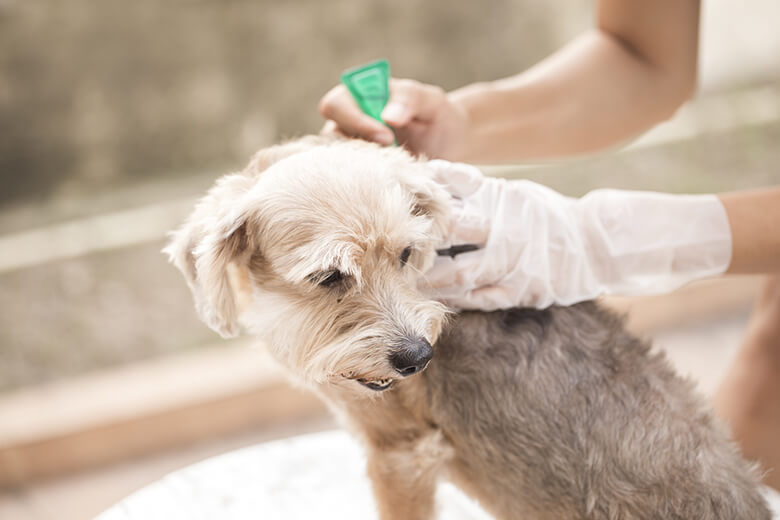Warm weather is here! The beach beckons. There’s cool drinks on the balcony or in the backyard. Barbecues. Volleyball. Not to mention, mosquitoes, ticks, fleas and a host of other insects that can make your dog miserable.
But it’s about more than discomfort. An unprotected dog in a buggy environment — that is, basically everywhere outdoors — can become very, very sick from these parasites. Believe it or not, a flea infestation left untreated can actually kill your dog. Mosquitoes carry heartworm disease, which can also be fatal if left untreated. And ticks carry Lyme’s Disease, Rocky Mountain Fever and Ehrlichiosis.
Let’s take a look at those insects, bugs and mites and see what we can to do help our dog have a safe and happy summer.
Fleas
Flea bites are incredibly itchy. The flea’s saliva is an irritating substance, and many dogs are allergic to it. Fleas can cause several diseases, some of which can be life-threatening.
Fleas can cause flea bite dermatitis in an allergic dog, which can lead to hair loss, reddened skin, sores and scabs.
Related: 7 Awesome Dog Carrier Backpacks for Summer Hiking
Fleas drink your dog’s blood. Left untreated, the infestation becomes severe as the fleas lay eggs that hatch into more fleas. Eventually, this leads to extreme blood loss and anemia, which can be fatal.
Not only that, but flea eggs drop onto your floor, which can infest your home with thousands of new fleas. Once they’re in your home, they will continue to reinfest your dog (and you) until you get rid of them.
Fleas also carry tapeworms, which get into your dog’s intestines, where they can live happily, absorbing the nutrients that are supposed to nourish your dog.
Ticks
Ticks attach to your dog by inserting their mouth into the skin where they feed on your dog’s blood. Ticks carry the bacteria that causes Lyme’s Disease and Ehrlichia diseases, which both can make your dog very sick. They can also spread Rocky Mountain Fever, a parasite that acts like a virus.
Lyme Disease can cause swelling of the joints and result in lameness. Rocky Mountain Fever can cause lameness, irregular heartbeat, blood clots, and a host of other seriously scary symptoms. Ehrlichia diseases include Canine Monocytic Ehrlichiosis, which can lead to abnormal bruising and bleeding, chronic eye inflammation, neurological abnormalities and sometimes lameness. Canine Granulocytic Ehrlichiosis commonly causes lameness, fever, vomiting, diarrhea and neurological abnormalities.
There is also a disease called Tick Paralysis, caused by a toxin in the tick’s saliva that directly affects the nervous system, resulting in lower motor neuron paralysis, which affects the nerves that connect the spinal cord and muscles.
Mosquitoes
Mosquitoes itch, but they have much worse effects. Less common is West Nile virus and encephalitis. These diseases are rare in dogs in the United States, but heartworm is not. Mosquitoes carry the heartworm parasite, which is common — and very serious.
Heartworm disease causes severe lung disease, heart failure, organ damage and eventually death. According to the FDA, “In the United States, heartworm disease is most common along the Atlantic and Gulf coasts from the Gulf of Mexico to New Jersey and along the Mississippi River and its major tributaries, but it has been reported in dogs in all 50 states.”
The signs of Heartworm disease include a persistent cough, fatigue, decreased appetite and weight loss. As the disease progresses, it leads to heart failure and the appearance of an extended belly because excess fluid is building up in the abdomen. Dogs can develop sudden blockages of blood in the heart leading to life-threatening heart failure, called caval syndrome.
Caval syndrome causes a sudden occurrence of labored breathing, pale gums and dark or bloody urine. At this point, the only way to save your dog is by immediate surgery to remove the heartworm blockage.
Related: Beat the Heat: Here Are the Top Cooling Mats for Your Dog
Those are the main insect diseases that can affect your dog. Let’s look at some ways to keep your dog safe.
Insect Protection for Your Dog
There are three basic forms of insect protection for your dog: topicals, collars and oral medications. Topicals are applied at the base of the neck or between the shoulder blades monthly. Most kill fleas and ticks, and some also prevent heartworm. Oral medications don’t repel insects; they kill them. Collars contain a concentrated chemical that can kill and repel fleas and ticks, but they can be irritating to some dogs, they can have a strong smell and they can be harmful to humans, especially children, handled excessively.
Topicals
The most popular are topicals:
Revolution
Revolution is applied between the shoulders once a month. It prevents fleas, ticks, ear mites, scabies, ticks, heartworm, roundworm and hookworm. Revolution is noteworthy because it’s one of the few treatments that prevent heartworm disease without extra oral medication. It also treats and controls sarcoptic mange. Revolution is sold in 3, 6 or 12 doses, and it’s packaged according to your dog’s weight, from under 5 pounds to 130 pounds. It does require your veterinarian to approve a prescription. It can cost anywhere from $43.19 to $235.94
Frontline
Frontline is now available in a new formulation called Frontline Gold, which kills fleas, flea eggs and larvae, lice and ticks. It works to prevent new fleas from hatching while killing the fleas that are infecting your dog. It does not kill or repel mosquitos or prevent heartworm, so an extra heartworm prevention oral medicine is necessary. Frontline Gold is packaged in 3, 6, or 12 pack doses, and is ordered by your dog’s weight from 5 pounds to 89 pounds and up. The price tends to be between $49.99 to $184.96
K9 Advantix II
Another topical, K9 Avantix II kills and protects against fleas, ticks, lice, biting flies and mosquitoes. While it does not kill heartworm, it does work to prevent the disease by protection your dog against mosquitos, the source of heartworm. It is sold in 4, 6, and 12 dose packs and for dogs up to 10 pounds and over 55 pounds. It is priced around $48.23 to $126.23
Oral Treatments
Oral treatments are effective at killing insects but not repelling them. In other words, the flea or the tick has to bite your dog first. They can also have side effects that may include vomiting, itching, diarrhea, lethargy, skin reactions and lack of appetite. The most important oral treatment to know is the one that prevents heartworm.
Heartgard Plus
Heartgard Plus protects against heartworm and treats and controls roundworms and hookworms. It comes in chewable treats made with real beef that most dogs love. Available for dogs 1-25 pounds, 26-50 pounds, and 51-100 pounds. In 6 and 12 dose packs. The price tends to be around $31.98 to $89.96
To check out other oral insect protection and decide which one is safe (or you feel comfortable with), check out Whole Dog Journal or talk to your veterinarian.
Flea and Tick Collars
While these collars cannot treat a dog that is already infested, they can help treat and kill fleas and ticks by releasing a chemical into the skin.
Seresto Flea and Tick Collar for Dogs
The Seresto collar kills fleas and ticks and also repels them before they bite. It can work up to 8 months as long as you only bathe your dog once a month. Low doses of two chemicals are released over time into your dog’s skin and hair. It comes in two sizes for small dogs up to 18 pounds and large dogs over 18 pounds. The price is around $38.49/$46.19
Related: Check Out the Boots That’ll Prevent Your Dog’s Paws From Being Burnt During the Summer
























